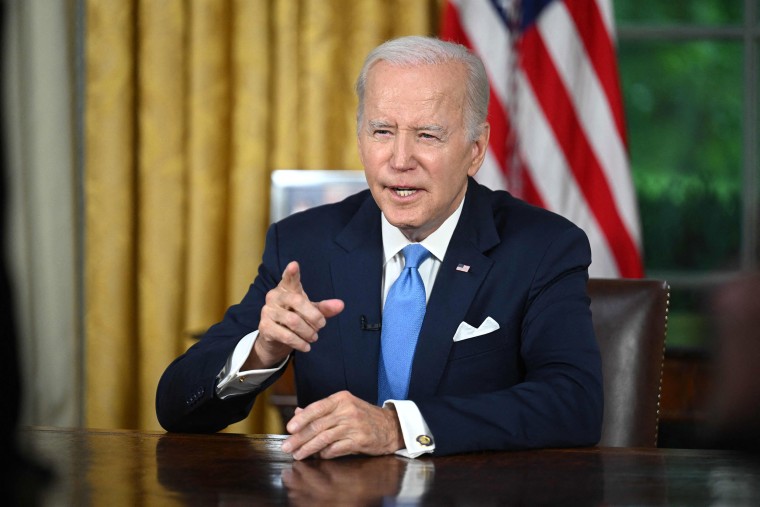President Joe Biden on Saturday signed into law a bill extending the debt ceiling for two years, averting an economically disastrous debt default ahead of Monday’s deadline.
The Fiscal Responsibility Act of 2023 suspends the public debt limit through January 1, 2025, after the 2024 presidential elections.
“If we had failed to reach an agreement on the budget, there were extreme voices threatening to take America, for the first time in our 247 year history, into default on our national debt,” Biden said of the deal Friday night in his first televised address from the Oval Office.
“Nothing, nothing would have been more irresponsible. Nothing would have been more catastrophic,” he added.
The Senate passed the bipartisan budget deal in a 63-36 vote Thursday. The House passed the legislation a day earlier by a vote of 314 to 117, with 149 Republicans joining 165 Democrats in favor of the agreement brokered by Biden and House Speaker Kevin McCarthy, R-Calif., after months of political warfare over government spending.
The legislation caps spending for the next two years and includes conservative measures to claw back about $28 billion in unspent Covid relief funds, as well as eliminating $1.4 billion in IRS funding and shifting roughly $20 billion of the $80 billion the IRS got through the Inflation Reduction Act to nondefense funding.

It also restarts federal student loan payments after a lengthy pause that began at the start of the pandemic, and adds work requirements for people up to age 55 to get benefits under the Supplemental Nutrition Assistance Program and Temporary Assistance for Needy Families, with carve-outs for veterans and homeless people. The current threshold is 50 years old.
Biden initially refused to negotiate with McCarthy over the debt ceiling, insisting that the House needed to pass a so-called clean bill without any spending cuts or policy provisions. “I will not let anyone use the full faith and credit of the United States as a bargaining chip,” Biden said in January.
But the new Republican House speaker said the House wouldn’t vote to raise the debt limit without significant budget cuts. Despite split factions in the GOP, with hardline Republicans demanding deeper spending cuts and policy changes, McCarthy was able to wrangle his narrow majority to pass a partisan bill in late April that would impose budget cuts in exchange for raising the debt ceiling.
House passage of that bill helped force Biden to the bargaining table, setting off weeks of frenzied talks that culminated in a deal late last month. It came together just days before a June 5 deadline.
The Treasury Department hit its statutory borrowing limit in January but was able to use “extraordinary measures” to pay the country’s bills — up to a point. Treasury Secretary Janet Yellen had warned that the country was at risk of breaching the debt ceiling on Monday.
In a May 26 letter to McCarthy, Yellen warned that “we now estimate that Treasury will have insufficient resources to satisfy the government’s obligations if Congress has not raised or suspended the debt limit by June 5.”
Failure to do so, she warned, “would cause severe hardship to American families, harm our global leadership position, and raise questions about our ability to defend our national security interests.”
Zoë Richards and Molly Roecker contributed.






